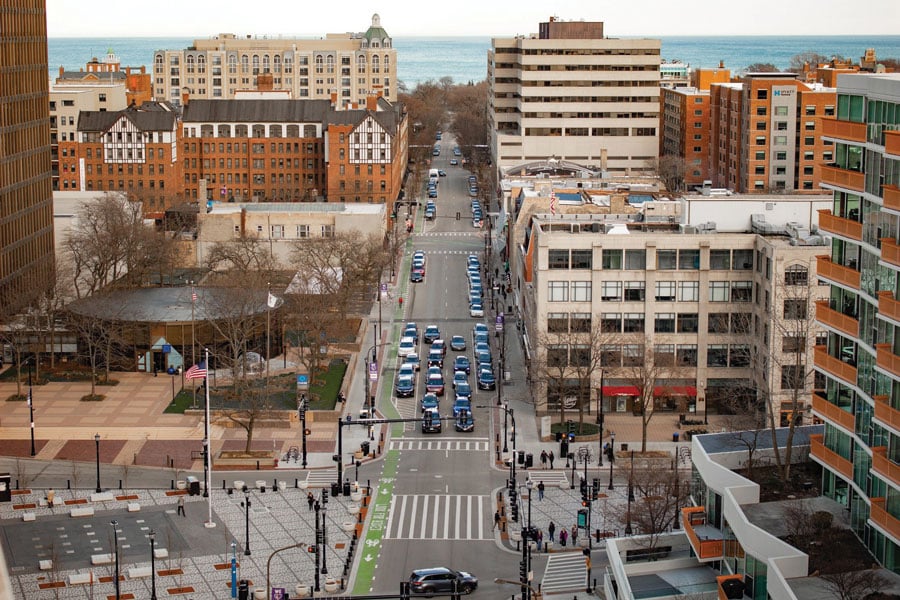MOSAIC Co-op offers conscious off-campus living
Daily file photo by Evan Robinson-Johnson
A view of Evanston from above. MOSAIC Co-op offers a unique housing opportunity for students looking to live in Evanston, but not on campus.
February 11, 2020
Leaving for college often represents the first move away from home for many young adults. But for some students, such as SESP senior Lily Zhang, moving away helped them find the place that felt most like home: the MOSAIC Co-op.
“It felt more like my home than my parents’ place,” Zhang said. “MOSAIC was definitely one of the strongest support systems I’ve had.”
Many residents said the MOSAIC Co-op — a housing community spread across two houses in Evanston — provides a strong sense of home and family by giving them a group of people to come home to after a long day. Originally founded by two Northwestern students who were disappointed with a lack of off-campus community, the Co-op strives to create a space for residents to bond, according to its mission statement.
The two houses, one named the Zooo and the other named the Treehouse, differ from a group of friends just sharing a house. The residents of the Co-op place an emphasis on the social, economic and political environmental consequences of their actions, according to MOSAIC’s website.
This plays out prominently in a few ways; for example, all of the meals served in the house are vegetarian. By bringing together residents that respect sustainability and social justice, the Co-op facilitates natural friendships, Zhang said.
Treehouse resident Schelly Murphy said that her love for social justice made it difficult to live with roommates who were not as passionate, inspiring her to seek out MOSAIC.
“I’m pretty big into activism and I’ve had experiences of living with people who did not share those views,” Murphy said.
MOSAICalso facilitates a family environment by running both residences democratically, meaning that all house members help decide how the house will function in terms of chores and administrative tasks. Chores, including cooking dinner or grocery shopping, are split amongst residents.
Residents also develop tight-knit bonds based on planned group activities, including open-mic nights for the Evanston community and movie nights where housemates gather on the couch to watch someone’s favorite film, Zhang said.
Residents also can meet four to five times a week for communal dinners, according to the MOSAIC website. Some said their favorite Co-op memories come from the random conversations that happen over the dinner table.
“At dinner, someone will be like ‘I’m going to be getting a tattoo’ or ‘I’m getting my ears pierced’ and someone else will say ‘Oh, I’ve thought about doing that for a while, do you want to go together?’” Zhang said. “It’s pretty spontaneous and happens pretty regularly.”
Though residents share unplanned moments together, the co-op also organizes larger celebrations. For example, the Treehouse held a Lunar New Year celebration, complete with boiling and eating homemade dumplings. Resident and SESP graduate student Sunny Suntharanund said that event became one of her favorite memories in the Co-op.
Residents come and go throughout the year, with move-in times scheduled around the quarter system, meaning that members and house dynamics are constantly changing. When residents leave, some opt for a send-off party, in which residents go around and share their favorite part of living with that person along with lighthearted roasts. Others have a quiet departure.
“It’s always sad because it’s one person who was a part of our family for a certain amount of time leaving,” Suntharanund said. “The transitional nature of the co-op is difficult sometimes because of that.”
Even after residents leave the Co-op, many stay in touch with one another. Zhang, for example, moved out of the Zooo last year, but she said she still feels connected to the residents and goes back to visit.
The changing nature of the houses means that new members are relatively common in both residences. Membership is not very competitive, according to membership chair Schelly Murphy. The application process, consisting of short answers and then an interview, is mostly meant to ensure that the individuals truly value community and also want to live consciously, rather than simply wanting a place to live.
Murphy said that the houses usually accept everyone they interview if they have the space. They sometimes reject applicants if they don’t fit the values of the houses or if they make another resident feel unsafe.
Because of shared values, Zhang said Co-op residents get along naturally.
“The transition felt very smooth because most of the people were people I would have been friends with anyway,” Zhang said. “Just living with a group of people who are your friends and are really supportive and are constantly there is really helpful.”
Email: anikamittu2023@u.northwestern.edu
Twitter: @anika_mittu



